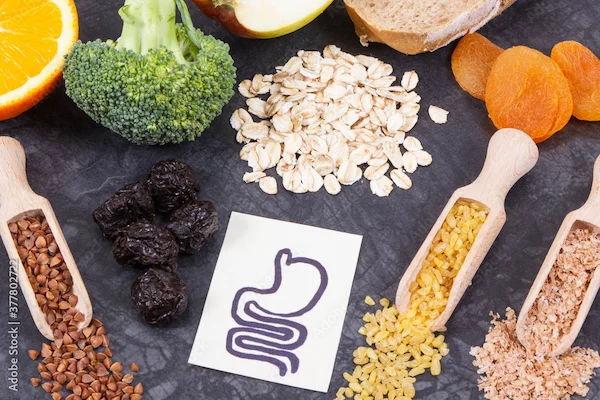How to Reduce Flatulence?
Struggling with excessive gas and bloating? Learn how to reduce flatulence with simple diet changes, lifestyle habits, and effective remedies for better digestive health.

Written by
Last updated on 3rd Jul, 2025
Introduction
Flatulence, also known as passing gas or farting, is a normal bodily function that everyone experiences. While it’s completely natural, excessive or painful flatulence can cause discomfort and be a little embarrassing. Luckily, simple changes to your diet and lifestyle can help reduce gas and bloating. In this guide, we’ll explore what causes flatulence, how you can manage it, and when it’s time to seek professional help.
Understanding Flatulence
Flatulence occurs when the body expels gas that has built up in the digestive system. While it’s a completely natural process, excessive gas can sometimes be a sign of a digestive issue. Flatulence happens when food moves through your digestive tract, and your gut bacteria help break it down, producing gas. In most cases, it’s a harmless process, but when it becomes frequent or painful, it can lead to discomfort.
Several factors contribute to flatulence. Some of the most common causes include:
Foods that produce gas: Certain foods, particularly those high in fibre, can cause gas when they break down in the gut. Beans, cabbage, broccoli, and whole grains are known for their gas-producing properties.
Swallowing air: We all swallow small amounts of air when we eat or drink. However, eating too quickly, chewing gum, or drinking carbonated beverages can lead to swallowing extra air, which results in more gas.
Gut health: An imbalance in gut bacteria can lead to excessive gas production. If your digestive system isn’t processing food properly, more gas can be produced.
Underlying conditions: Food intolerances (such as lactose intolerance) and conditions like irritable bowel syndrome (IBS) or celiac disease can make flatulence more frequent.
If your flatulence is accompanied by other symptoms, such as pain or bloating, or if it’s happening regularly, it could be a sign that something more serious is going on.
How to Change Your Diet to Reduce Gas?
What you eat plays a huge role in how much gas your digestive system produces. By being mindful of your food choices, you can significantly reduce the frequency of flatulence.
1. Foods to Avoid
There are certain foods that are more likely to cause gas. These include:
High-fibre foods: While fibre is important for digestion, too much fibre, especially from foods like beans, broccoli, cabbage, and whole grains, can lead to increased gas production.
Dairy: For people who are lactose intolerant, consuming dairy products can cause bloating, cramps, and excessive gas.
Carbonated drinks: Soda and sparkling water are fizzy, which means they can introduce excess air into your stomach, leading to more gas.
Processed foods: Some processed foods contain artificial sweeteners (like sorbitol) that can cause gas.
2. Foods that Help Reduce Gas
While some foods produce more gas, others can help ease bloating and support digestion:
Ginger: A well-known digestive aid, ginger can help soothe your stomach and reduce bloating. Try adding it to your meals or sipping ginger tea.
Peppermint: Peppermint is a natural muscle relaxant that can calm the digestive tract and reduce bloating and discomfort.
Fennel seeds: Known for their ability to relieve gas, fennel seeds are a great option for reducing bloating. Try chewing them after meals or drinking fennel tea.
Probiotics: Adding probiotic-rich foods like yoghurt, kefir, and kimchi to your diet can help balance your gut bacteria, improving digestion and reducing gas over time.
3. The Right Amount of Fibre
Fibre is essential for healthy digestion, but it’s important to get the balance right. Too much insoluble fibre (found in whole grains and some vegetables) can cause more gas, while soluble fibre (found in foods like oats, apples, and carrots) is gentler on the digestive system and can help manage bloating.
Consult Top Doctors for Personalised Treatment
Lifestyle Changes to Help Reduce Flatulence
Alongside dietary changes, certain lifestyle habits can play a huge role in reducing flatulence.
1. Eating Habits and Meal Timing
The way you eat can have just as much of an impact as what you eat. Here are a few simple tips:
Eat slowly: Eating too quickly can cause you to swallow air, which leads to gas. Take your time to chew your food thoroughly, and avoid talking while chewing.
Smaller, more frequent meals: Rather than eating large meals, try eating smaller meals throughout the day. This helps your digestive system process food more efficiently.
Avoid late-night meals: Eating large meals right before bed can disrupt your digestion, leading to bloating and gas overnight. Aim to finish eating at least a couple of hours before going to sleep.
2. Get Moving
Regular physical activity supports healthy digestion and helps prevent gas from building up in the intestines. You don’t have to hit the gym for this – simple activities like walking, yoga, or even light stretching can encourage digestion and reduce bloating.
3. Manage Stress
Stress and anxiety can slow down digestion and worsen symptoms of gas and bloating. Finding ways to manage stress, such as deep breathing exercises, meditation, or yoga, can benefit your gut health and reduce flatulence.
Medical and Natural Remedies
If diet and lifestyle changes aren’t enough, there are several remedies that can help relieve excess gas.
Over-the-counter Medications: For occasional gas, medications like simethicone (found in products like Gas-X) can help break up gas bubbles and provide relief. These products are typically safe for short-term use but may not address the root cause of the problem.
Herbal and Home Remedies: Herbal teas made from peppermint, ginger, or chamomile can naturally soothe the digestive system and reduce bloating. Fennel seeds are another excellent remedy to reduce gas and improve digestion. These natural options can be a great complement to dietary and lifestyle changes.
When to Seek Medical Help: If flatulence is frequent or associated with other symptoms like weight loss, diarrhoea, or blood in the stool, it’s important to seek medical advice. These symptoms could be a sign of an underlying condition, such as IBS, celiac disease, or a food intolerance, which might require medical treatment.
Preventing Flatulence: Long-Term Strategies
Long-term prevention of flatulence involves making sustainable changes to your lifestyle and habits.
Stick to a Balanced Diet: Maintain a diet that includes a balance of fibre, healthy fats, and lean proteins. Be mindful of foods that trigger gas, and try to stick to a consistent eating schedule. Keeping a food diary can help you identify specific triggers.
Regular Exercise: Incorporating regular physical activity into your routine helps keep the digestive system working smoothly. Even just 30 minutes of moderate exercise, like walking or swimming, can help reduce bloating and gas.
Take Care of Your Gut Health: A healthy gut microbiome is key to reducing gas. Consuming prebiotics (foods that feed healthy bacteria, like bananas and onions) and probiotics (found in yoghurt and kefir) can help maintain a balanced gut environment and improve digestion.
Myths About Flatulence
There are plenty of misconceptions about flatulence, but it’s important to separate fact from fiction.
Not all high-fibre foods cause gas: Some types of fibre, like soluble fibre found in oats and apples, can help ease digestion without causing bloating. Insoluble fibre can be more problematic for some people, but it's not the case for everyone.
Lifestyle changes are often more effective than medications: While over-the-counter medications can provide temporary relief, lifestyle and dietary changes are the most effective long-term solutions for reducing flatulence.
Conclusion
Flatulence is a natural process, but excessive or painful gas can be disruptive. By making small changes to your diet, eating habits, and lifestyle, you can significantly reduce flatulence and improve your digestive health. If you’re dealing with chronic or painful gas, it’s important to consult with a doctor to rule out any underlying conditions. With a balanced approach, you can enjoy a more comfortable and gas-free life.
Consult Top Gastroenterologists
Consult Top Gastroenterologists

Dr. Santhosh Kumar
Gastroenterology/gi Medicine Specialist
7 Years • MBBS, MD (General Medicine), DNB ( Gastroenterology)
Bengaluru
VISTA SPECIALITY CLINIC, Bengaluru

Dr. Chethan T L
General Physician/ Internal Medicine Specialist
5 Years • MBBS, MD, DNB (General Medicine)
Bengaluru
Apollo Medical Center, Marathahalli, Bengaluru

Dr Harish K C
Gastroenterology/gi Medicine Specialist
15 Years • MBBS MD DM MRCP(UK) (SCE-Gastroenterology and Hepatology)
Bengaluru
Apollo Clinic, JP nagar, Bengaluru

Dr Rohit Sureka
Gastroenterology/gi Medicine Specialist
15 Years • MBBS, DNB General Medicine, DNB Gastroenterology
Jaipur
Apollo 247 virtual - Rajasthan, Jaipur

Dr. Jatin Yegurla
Gastroenterology/gi Medicine Specialist
11 Years • MD (PGI), DM (AIIMS Delhi), FAGIE (AIIMS Delhi), ESEGH (UK), Gold Medalist
Hyderabad
Apollo Hospitals Jubilee Hills, Hyderabad
(625+ Patients)
Consult Top Doctors for Personalised Treatment

Dr. Santhosh Kumar
Gastroenterology/gi Medicine Specialist
7 Years • MBBS, MD (General Medicine), DNB ( Gastroenterology)
Bengaluru
VISTA SPECIALITY CLINIC, Bengaluru

Dr. Chethan T L
General Physician/ Internal Medicine Specialist
5 Years • MBBS, MD, DNB (General Medicine)
Bengaluru
Apollo Medical Center, Marathahalli, Bengaluru

Dr Harish K C
Gastroenterology/gi Medicine Specialist
15 Years • MBBS MD DM MRCP(UK) (SCE-Gastroenterology and Hepatology)
Bengaluru
Apollo Clinic, JP nagar, Bengaluru

Dr Rohit Sureka
Gastroenterology/gi Medicine Specialist
15 Years • MBBS, DNB General Medicine, DNB Gastroenterology
Jaipur
Apollo 247 virtual - Rajasthan, Jaipur

Dr. Jatin Yegurla
Gastroenterology/gi Medicine Specialist
11 Years • MD (PGI), DM (AIIMS Delhi), FAGIE (AIIMS Delhi), ESEGH (UK), Gold Medalist
Hyderabad
Apollo Hospitals Jubilee Hills, Hyderabad
(625+ Patients)




